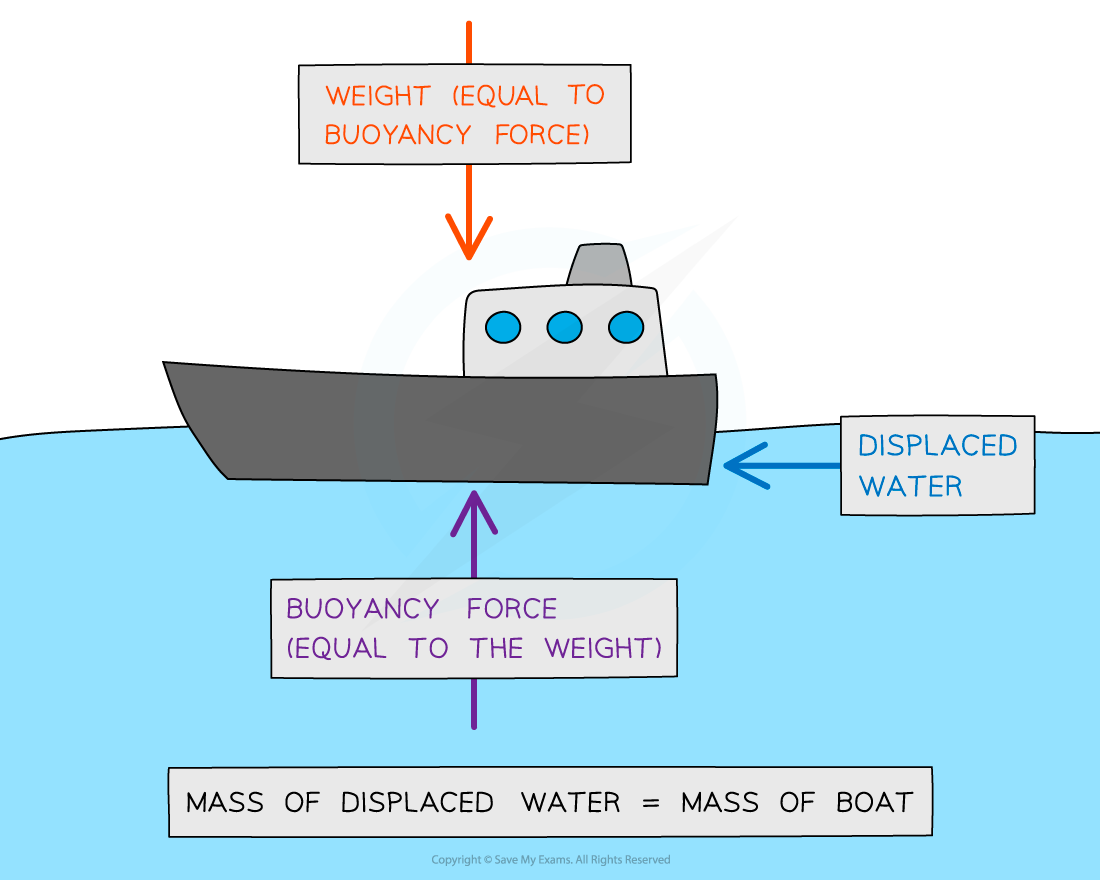Archimedes' Principle (Cambridge (CIE) A Level Physics): Revision Note
Exam code: 9702
Archimedes' principle
Archimedes’ principle states that:
An object submerged in a fluid at rest has an upward buoyancy force (upthrust) equal to the weight of the fluid displaced by the object
The object sinks until the weight of the fluid displaced is equal to its own weight
Therefore, the object floats when the magnitude of the upthrust equals the weight of the object
The magnitude of upthrust can be calculated by:
Where:
F = force in newtons (N)
ρ (Greek letter rho) = density in kilograms per metre cubed (kg m-3)
g = gravitational field strength in newtons per kg (N kg-1)
V = volume in metres cubed (m3)
Since m = ρV, upthrust is equal to F = mg which is the weight of the fluid displaced by the object
Archimedes’ Principle explains how ships float:
Upthrust on a boat

Boats float because they displace an amount of water that is equal to their weight
Worked Example
Icebergs typically float with a large volume of ice beneath the water. Ice has a density of 917 kg m-3 and a volume of Vi.
The density of seawater is 1020 kg m-3.
What fraction of the iceberg is above the water?
A. 0.10 Vi
B. 0.90 Vi
C. 0.97 Vi
D. 0.20 Vi
Answer:
Step 1: List the known quantities
Density of ice, ρi = of 917 kg m-3
Volume of ice = Vi
Density of seawater, ρw = 1020 kg m-3
Volume of seawater = Vw
Step 2: Consider Archimedes' Principle
According to Archimedes' Principle the force of upthrust is equal to the weight of the seawater displaced by the iceberg
Buoyancy force is the weight of the displaced water
Step 3: Equate the forces of weight and upthrust
Since the iceberg is floating, its weight is exactly equal to the buoyancy force
Step 4: State the density equation and rearrange for mass
Step 5: Substitute ρV for mass in the mg equivalence
Step 6: Determine the ratio of densities
Cancelling g:
Dividing by
Step 7: Solve for the volume of ice submerged underwater
This means that 90% of the iceberg's volume is submerged underwater
The correct answer is B
Examiner Tips and Tricks
Don't get confused by the two step process to find upthrust.
Step 1: You need the volume of the submerged object, but only because you want to know how much fluid was displaced
Step 2: What you really want to know is the weight of the displaced fluid.
A couple of familiar equations will help;
m = ρV to get mass
then
W = mg to get weight
If you are feeling particularly mathematical, you can combine your equations, so that W = ρVg

Unlock more, it's free!
Did this page help you?